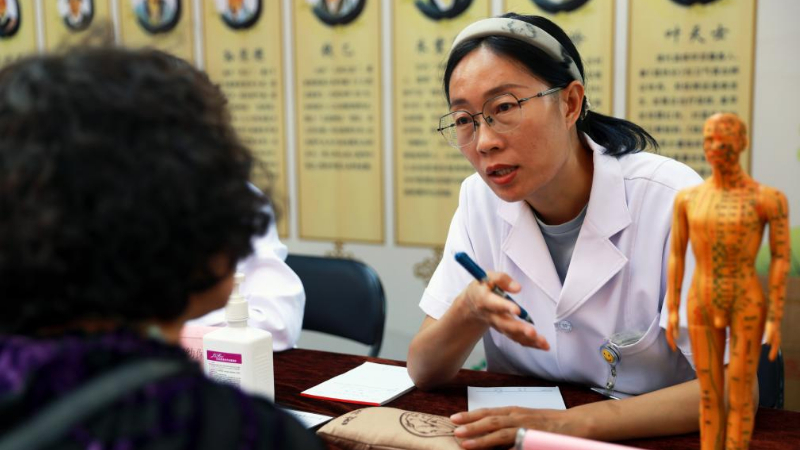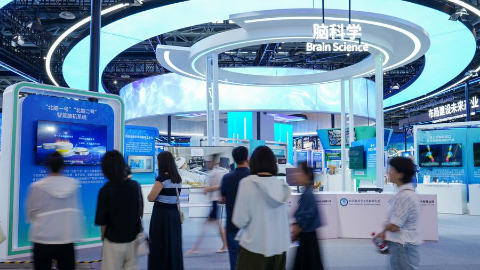Xinhua Headlines: German carmakers hit by U.S. tariffs, eye closer China-EU cooperation
Source: Xinhua
Editor: huaxia
2025-08-10 22:17:32
*Amid growing uncertainty and shifting trade policies in transatlantic markets, a growing number of German companies are pivoting to China, drawn by its regulatory stability and clearer growth outlook.
*Through local production, technology partnerships and targeted investment, automakers are seeking to strengthen their position in Asia and accelerate structural transformation.
BERLIN, Aug. 10 (Xinhua) -- Since April, a sharp hike in U.S. tariffs on EU-made vehicles has dealt a heavy blow to Europe's auto industry, causing steep declines in the profits of Germany's biggest carmakers and prompting them to seek opportunities in Asia.
A recent deal between the EU and the United States lowered the tariff rate from 25 percent to 15 percent, easing immediate tensions. But experts warn the reprieve may be short-lived, as high export costs and lingering policy uncertainty continue to weigh on Germany's manufacturing sector and erode industry confidence.
TARIFF SHOCK DRAGS DOWN EARNINGS
BMW, Mercedes-Benz and Volkswagen -- Germany's three largest automakers -- all reported steep declines in profits in the first half of 2025, citing U.S. tariffs as a major drag on earnings.
BMW said group revenue fell 8.2 percent year-on-year, while net profit dropped 29 percent. The company pointed to elevated tariffs as a key factor behind weaker margins in its core auto business. Mercedes-Benz saw net income plunge from around 6.1 billion euros (7.08 billion U.S. dollars) a year ago to roughly 2.7 billion euros (3.15 billion dollars).
Volkswagen Group reported a marginal 0.3 percent decline in sales revenue. Its premium brand, Porsche, was hit especially hard, incurring around 400 million euros (466 million dollars) in additional tariff-related costs in the first half alone.
Cash flow is also under pressure. According to the Financial Times, the combined free cash flow of the three companies could shrink by as much as 10 billion euros (11.65 billion dollars) this year, with tariff costs and broader economic headwinds both playing a role.
Despite the latest tariff cut, sentiment across the industry remains subdued. Several firms have already revised down their 2025 outlooks. Hildegard Mueller, president of the German Association of the Automotive Industry (VDA), said the lower rate still leaves carmakers with billions of euros in added costs each year, a heavy burden as they navigate a pivotal transition toward electrification.
Sigrid de Vries, director general of the European Automobile Manufacturers' Association, warned that continued high U.S. tariffs on vehicles and parts risk undermining the EU industry's global competitiveness, disrupting U.S. supply chains and hurting consumers.
STRUCTURAL CHALLENGES RUN DEEP
The slump in earnings facing German carmakers stems not only from short-term tariff shocks but also from a broader set of structural challenges.
U.S. duties are rippling through the supply chain. With the United States imposing 50 percent tariffs on imported steel, aluminum and other materials, upstream suppliers are passing rising costs to manufacturers, further squeezing already tight margins.
According to the VDA, Germany exported around 450,000 vehicles to the United States in 2024. Over the same period, German carmakers produced more than 840,000 vehicles at U.S. facilities, roughly half of which were exported globally. This cross-border production model is especially vulnerable to abrupt policy shifts.
Volkswagen CEO Oliver Blume said the group's U.S. plants were heavily affected by the tariff hikes, incurring an extra 1.3 billion euros (1.51 billion dollars) in costs in the first half alone. Juergen Rittersberger, Audi's chief financial officer, put the brand's losses at around 600 million euros (699 million dollars) due to the tariffs.
Since early 2024, several automakers and suppliers, including Ford, Stellantis, Volkswagen, ZF and Bosch, have announced layoffs or plant closures in Germany and other European countries.
Shrinking order books, rising energy and labor costs are undermining the region's industrial competitiveness. At the same time, German carmakers continue to trail their U.S. and Chinese rivals in the race to electrification.
TURNING EASTWARD FOR OPPORTUNITIES
Amid growing uncertainty and shifting trade policies in transatlantic markets, a growing number of German companies are pivoting to China, drawn by its regulatory stability and clearer growth outlook. Through local production, technology partnerships and targeted investment, automakers are seeking to strengthen their position in Asia and accelerate structural transformation.
Arno Antlitz, Volkswagen's chief finance officer and chief operating officer, recently voiced strong confidence in expanding local platforms and battery partnerships in the Chinese market.
BMW also announced a collaboration with Chinese tech firm Momenta to co-develop next-generation driver assistance systems tailored for local consumers.
"This powerhouse collaboration, with China's wisdom, underpins BMW's strategy of 'In China, for China and co-creation at China speed,' taking it to new heights," said Sean Green, president and CEO of BMW Group Region China, while stressing the importance of using complementary strengths and joint innovation to achieve breakthrough progress.
"The future of the auto industry is in China," said Ferdinand Dudenhoeffer, a renowned German automotive expert. He urged expanding cooperation between German and Chinese players across the vehicle and supply chain landscape.
BMW and Porsche offer performance advantages, while Mercedes-Benz leads in design and comfort, and all three are increasingly relying on China's edge in battery technology and scaled production to stay competitive, said Dudenhoeffer.
As the recent U.S.-EU tariff deal creates deep uncertainty for businesses, Michael Schumann, chairman of the German Federal Association for Economic Development and Foreign Trade, warned that the global trading system is under rising strain with trade increasingly used as a geopolitical tool.
In a fragmented global landscape, China may represent one of the pillars of regulatory stability for international firms, he said.■











Comments